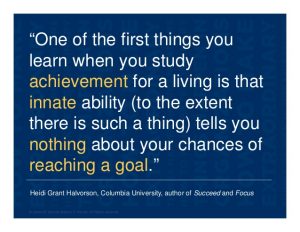 High self-esteem can be expressed in the picture of the cat looking in the mirror seeing herself as a lion. But is she? No. Therefore, any time she is just a cat, doing what cats do, she will feel bad about herself, because she isn’t living up to her own self-image of a roaring lion. She won’t be happy just being a cat, she won’t take correction, she’ll argue with you to death that she is OK, she doesn’t need to change, that she is a perfect lion.
High self-esteem can be expressed in the picture of the cat looking in the mirror seeing herself as a lion. But is she? No. Therefore, any time she is just a cat, doing what cats do, she will feel bad about herself, because she isn’t living up to her own self-image of a roaring lion. She won’t be happy just being a cat, she won’t take correction, she’ll argue with you to death that she is OK, she doesn’t need to change, that she is a perfect lion.
That cat is you, my dear. Result: everything you try to change your life fails, because in order to change you need to allow yourself to not be perfect. In order to be trained, you need to empty your mind of everything that’s there, and declare yourself ignorant.
If the cornerstone of your existence is that you are perfect, you won’t be able to do that… and a trainer will have to force-feed you… and with luck and a lot of effort, will be able to sneak in a spoonful of stuff… if any.
So you’ll stay the same: miserable, because of the gap between reality and pretense… between real and fake perfection… full of anguish, anxiety, trepidation… and you know, because of the high emotion, also stupid. Emotions up, intelligence down… goes the saying, and it’s so true!
In light of the amazing and truly trying session we had yesterday on the Playground, I am starting to see that what works in life, for you and for me, for making the necessary changes so you can raise your vibration, become the calm, collected, Expanding Human Being, the self-image you so try to protect, must go, and needs to be replaced with “reality with an attitude”: called self-compassion.
I found this article for you: it’s great. Read it. You’ll love it.
To Succeed, Forget Self-Esteem
by Heidi Grant Halvorson 1
If you look under the Self-Help heading on Amazon, you’ll find roughly 5,000 books listed under the subhead Self-Esteem. The vast majority of these books aim to not only tell you why your self-esteem might be low, but to show you how to get your hands on some more self-esteem. It’s a thriving business because self-esteem is, at least in Western cultures, considered the bedrock of individual success. You can’t possibly get ahead in life, the logic goes, unless you believe you are perfectly awesome.
And of course you must be perfectly awesome in order to keep believing that you are — so you live in quiet terror of making mistakes, and feel devastated when you do. Your only defense is to refocus your attention on all the things you do well, mentally stroking your own ego until it has forgotten this horrible episode of un-awesomeness and moved on to something more satisfying.
This doesn’t exactly sound like a recipe for success (or peace of mind and happiness), does it?
Recent reviews of the research on high self-esteem have come to the troubling conclusion that it’s not all it’s cracked up to be.
High self-esteem does not predict better performance or greater success. And though people with high self-esteem do think they’re more successful, objectively, they are not.
High self-esteem does not make you a more effective leader, a more appealing lover, more likely to lead a healthy lifestyle, or more attractive and compelling in an interview. But if high self-esteem (along with daily affirmations of your own terrificness) is not the answer to all your problems, then what is?
self-compassion, rather than self-esteem
A growing body of research suggest that self-compassion, rather than self-esteem, may be the key to unlocking your true potential for greatness.
Some of you are already skeptical about a term like “self-compassion.” But this is a scientific, data-driven argument — not feel-good pop psychology. So hang in there and keep an open mind.
Self-compassion is a willingness to look at your own mistakes and shortcomings with kindness and understanding — it’s embracing the fact that to err is indeed human.
When you are self-compassionate in the face of difficulty, you neither judge yourself harshly, nor feel the need to defensively focus on all your awesome qualities to protect your ego. It’s not surprising that self-compassion leads to higher levels of personal well-being, optimism and happiness, and to less anxiety and depression.
But what about performance? Self-compassion may feel good, but aren’t the people who are harder on themselves, who are driven to always be the best, the ones who are ultimately more likely to succeed?
what self-compassion is not
To answer that, it’s important to understand what self-compassion is not.
While the spirit of self-compassion is to some degree captured in expressions like give yourself a break and cut yourself some slack, it is decidedly not the same thing as taking yourself off the hook or lowering the bar. You can be self-compassionate while still accepting responsibility for your performance. And you can be self-compassionate while striving for the most challenging goals — the difference lies not in where you want to end up, but in how you think about the ups and downs of your journey. As a matter of fact, if you are self-compassionate, new research suggests you are more likely to actually arrive at your destination.
In their studies, Brienes and Chen asked participants to take either a self-compassionate or self-esteem enhancing view of a setback or failure. For example, when asked to reflect on a personal weakness, some were asked to “imagine that you are talking to yourself about this weakness from a compassionate and understanding perspective. What would you say?”
Others were asked to instead focus on boosting their self-esteem: “Imagine that you are talking to yourself about this weakness from a perspective of validating your positive qualities. What would you say?”
People who experienced self-compassion were more likely to see their weaknesses as changeable. Self-compassion — far from taking them off the hook — actually increased their motivation to improve and avoid the same mistake again in the future.
This increased motivation lead to demonstrably superior performance. For instance, in one study, participants who failed an initial test were given a second chance to improve their scores. Those who took a self-compassionate view of their earlier failure studied 25 percent longer, and scored higher on a second test, than participants who focused on bolstering their self-esteem.
Why is self-compassion so powerful? In large part, because it is non-evaluative
— in other words, your ego is effectively out of the picture — you can confront your flaws and foibles head on. You can get a realistic sense of your abilities and your actions, and figure out what needs to be done differently next time.
When your focus is instead on protecting your self-esteem, you can’t afford to really look at yourself honestly. You can’t acknowledge the need for improvement, because it means acknowledging weaknesses and shortcomings — threats to self-esteem that create feelings of anxiety and depression. How can you learn to do things right when it’s killing you to admit — even to yourself — that you’ve done them wrong?
Here’s an unavoidable truth: You are going to screw up.
Everyone — including very successful people — makes boatloads of mistakes. The key to success is, as everyone knows, to learn from those mistakes and keep moving forward. But not everyone knows how. Self-compassion is the how you’ve been looking for. So please, give yourself a break.
 Heidi Grant Halvorson, Ph.D. is associate director for the Motivation Science Center at the Columbia University Business School
Heidi Grant Halvorson, Ph.D. is associate director for the Motivation Science Center at the Columbia University Business School
